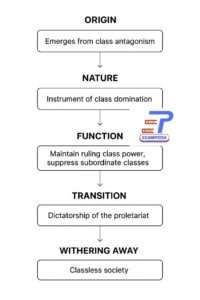Q1. “State is a Coercive Institution” (Marx). Explain.
Q2. Critically examine Marx’s Theory of Dialectical Materialism.
Q3. Analyse the class struggles of Marx.
Q4. Examine Marxian theory of Historical Materialism.
Q5. Discuss Marxian concept of State.
Q6. Discuss the contribution of Lenin in the history of Marxist thought.
Q7. Evaluate Marx’s views on economic analysis of History.
Q8. Examine the conception of the State in the ideologies of Fascism and Marxism. (UPSC-2014)
Q9. Discuss the relationship between base and superstructure in Marxist theory. (UPSC-2015)
Q10. Explain Marx’s understanding of Human Essence and Alienation. (UPSC-2016)
Q11. Differentiate between Freedom and Liberty. Discuss Marx’s notion of freedom. (UPSC-2017)
Q12. What is the contemporary relevance of Marxism? (UPSC-2019)
Q13. Discuss Marx’s concept of class (UPSC-2020)
Q15. Marx’s concept of ‘alienation’ is an essential part of the reality in capitalism. Explain. (UPSC-2021)
Q16. Comment on: “Revolution in Permanence” (UPSC-2022)
Q17. Marxism is a political theory of action demanding strict compliance with its core principles. Comment. (UPSC-2024)

Hey champs! you’re in the right place. I know how overwhelming exams can feel—books piling up, last-minute panic, and everything seems messy. I’ve been there too, coming from the same college and background as you, so I completely understand how stressful this time can be.
That’s why I joined Examopedia—to help solve the common problems students face and provide content that’s clear, reliable, and easy to understand. Here, you’ll find notes, examples, scholars, and free flashcards which are updated & revised to make your prep smoother and less stressful.
You’re not alone in this journey, and your feedback helps us improve every day at Examopedia.
Forever grateful ♥
Janvi Singhi

Give Your Feedback!!
Topic – Karl Marx (Q&A)
Subject – Political Science
(Western Political Thought)
The State is a central institution in political theory, representing authority, governance, and social organization. In Marxian thought, the State is not an eternal or neutral entity, but a historically specific instrument shaped by economic structures and class relations. Unlike liberal or conservative conceptions that view the State as a neutral arbiter or an organic institution of society, Marxism sees it as a product of class antagonisms, inherently biased in favor of the ruling class. The Marxian theory is grounded in the broader framework of historical materialism, which asserts that economic conditions and class relations are the primary determinants of political and social structures. Understanding the Marxian conception of the State requires a detailed examination of its nature, function, origin, evolution, and ultimate destiny within a class-based society.
Historical Materialism and the State
Marx’s conception of the State is rooted in historical materialism, which posits that the mode of production determines the political and legal superstructure. According to Marx, society is divided into classes based on their relationship to the means of production: in capitalism, these are the bourgeoisie (owners of capital) and the proletariat (workers). The State emerges as a mechanism to maintain the dominance of the ruling class, ensuring that the economic interests of the bourgeoisie are protected. Marx, in The Communist Manifesto, famously stated that “The executive of the modern State is but a committee for managing the common affairs of the whole bourgeoisie,” highlighting the State’s role as a class instrument rather than a neutral body.
Origin of the State
According to Marx, the State originates in class antagonisms. In pre-class societies, governance is often minimal or nonexistent because communal ownership prevails, and social harmony is maintained through customs and informal norms. With the emergence of private property, social inequality arises, giving birth to class divisions. The State, in Marx’s view, arises as a mechanism to institutionalize and perpetuate these class divisions, ensuring that the dominant class maintains economic and political control. Engels elaborates this idea in Origin of the Family, Private Property and the State, arguing that the State emerges “when society becomes polarized between oppressors and oppressed,” and its primary function is to safeguard the interests of the ruling class.
Nature of the Marxian State
The Marxian State is characterized by instrumentalism, coercion, and temporality. It is not an eternal or neutral institution, but a tool for the exercise of class power. Its nature is primarily coercive, employing laws, policing, military, and bureaucratic machinery to ensure that the dominant economic class maintains its position. In capitalist societies, the State protects private property rights, contracts, and market mechanisms, often intervening when these are threatened by social unrest or labor movements. Marx emphasizes that the State is structurally biased, reflecting the material conditions of production rather than abstract notions of justice or morality.
Functions of the State
The Marxian conception identifies several core functions of the State:
- Maintaining Class Domination: The State ensures that the ruling class consolidates its control over economic resources and political institutions. For example, laws regulating property, taxation, and trade often serve the interests of the bourgeoisie.
- Suppressing the Oppressed Class: The State uses coercion—through police, military, and legal systems—to suppress revolts or resistance from subordinate classes. Historical instances include industrial-era labor strikes that were often violently suppressed.
- Managing Class Conflict: While it primarily serves the ruling class, the State also acts as a mediator to prevent social unrest that could threaten social stability and economic productivity.
- Reinforcing Ideology: Marxists argue that the State also maintains ideological dominance through institutions such as education, media, and religion, which propagate norms favorable to the ruling class. Antonio Gramsci’s concept of cultural hegemony extends this idea, highlighting how consent is manufactured in addition to coercion.
Transition to Socialism and the “Dictatorship of the Proletariat”
A key aspect of Marxian theory is the historical trajectory of the State. Marx envisioned that the capitalist State is not eternal; it is a transitory structure bound to specific economic conditions. During the transition to socialism, the working class (proletariat) seizes state power, establishing what Marx and Engels termed the “dictatorship of the proletariat”. This is not a dictatorship in the conventional sense, but a temporary mechanism to dismantle the structures of class oppression and reorganize society along egalitarian lines.
Vladimir Lenin further elaborated this idea in State and Revolution, arguing that the proletarian State must smash the bourgeois apparatus, centralize authority, and suppress counter-revolutionary forces to facilitate the construction of a classless society. This transitional State is envisioned as a vehicle for social transformation, ultimately preparing the ground for the withering away of the State.
Withering Away of the State
The ultimate goal of Marxian theory is the abolition of the State. In a classless, communist society, social relations are no longer mediated by coercive institutions because class antagonisms disappear. Marx writes in Critique of the Gotha Program: “Between capitalist society and communism lies the period of the revolutionary transformation of the one into the other. The State then will not be necessary.” In this ideal society, governance becomes voluntary, decentralized, and self-regulating, reflecting collective interests rather than class domination.
Despite its theoretical appeal, the Marxian conception of the State has faced criticism and practical challenges. Critics like Friedrich Hayek argue that the assumption that the State can serve the working class without centralizing bureaucratic power is unrealistic. Historical examples such as the USSR under Stalin show that even a proletarian State can become authoritarian, bureaucratic, and self-serving, deviating from the vision of eventual statelessness. Robert Michels’ Iron Law of Oligarchy similarly highlights that any centralized organization, including a revolutionary State, risks concentration of power and elite domination.
However, proponents argue that these historical deviations do not invalidate the theoretical insights of Marx, which remain relevant in understanding inequalities, the role of the State in capitalist societies, and mechanisms of social change. Contemporary relevance is seen in welfare policies, labor rights legislation, and social justice movements, where the State is used to mediate class conflicts and redistribute resources.
Historical instances illustrate the Marxian State in action. The Bolshevik Revolution (1917) exemplifies the seizure of state power by the working class to overturn the bourgeois State. The subsequent establishment of Soviet-style institutions represents the transitional period of the dictatorship of the proletariat, albeit with authoritarian distortions. Modern welfare states, such as in Scandinavia, reflect selective adoption of Marxian principles, using the State to reduce economic inequality and provide social protection, without abolishing the State entirely.
The Marxian conception also informs contemporary critiques of capitalism, globalization, and neoliberal governance, highlighting how State institutions often reinforce economic hierarchies. Activists and scholars draw on Marxian insights to analyze labor exploitation, corporate influence on policy, and systemic inequalities, showing the enduring relevance of the theory.

Conclusion
The Marxian concept of the State presents a historically grounded, critical understanding of political power. It portrays the State as a tool of class domination, contingent on economic structures and social relations, rather than a neutral or eternal institution. Marxism emphasizes that the State is coercive, temporary, and historically situated, destined to transform and eventually disappear in a classless society. While criticisms regarding authoritarianism and bureaucratic centralization remain, the theory provides profound insights into social inequality, the functions of the State, and pathways for revolutionary change. Its relevance extends to contemporary social policy, welfare measures, and critiques of capitalist governance, making it a cornerstone of critical political thought. By situating the State within material and class contexts, Marxism challenges conventional assumptions and offers a dynamic framework to understand the interplay between economy, society, and political authority.
Marxism is not merely a philosophy but a revolutionary political theory of action. It was formulated by Karl Marx and Friedrich Engels in the 19th century. Rooted in historical materialism and the critique of capitalism, it insists on the abolition of private property, class struggle as the motor of history, and the establishment of a classless society. Unlike liberalism, which allows plural interpretations, Marxism demands strict compliance with its principles because its worldview is built upon the scientific analysis of capitalism and the inevitability of socialism. Thus, Marxism represents both a theory and praxis that must align consistently.
Marxism is fundamentally a praxis-oriented doctrine, integrating theory and practice. Marx himself wrote in Theses on Feuerbach (1845) that “Philosophers have only interpreted the world; the point, however, is to change it.” This demonstrates its action-oriented essence. The Communist Manifesto (1848) provides a blueprint for workers’ revolution, demanding that the proletariat seize power to dismantle bourgeois domination.
The core principles—dialectical materialism, historical materialism, the primacy of class struggle, and the eventual dictatorship of the proletariat—constitute non-negotiable foundations. Lenin emphasized that “without revolutionary theory, there can be no revolutionary movement.” Hence, Marxism binds its adherents to strict compliance, since deviation risks diluting its revolutionary character.
Marxism assumes that history follows scientific laws and that capitalism inevitably collapses under its contradictions. Because of this deterministic outlook, it sees its principles as universal and necessary. For instance, Lenin’s Vanguard Party model stressed strict adherence to Marxist principles to guide the proletariat, while Mao Zedong adapted Marxism to Chinese conditions but maintained ideological purity by rooting policies in “contradictions among the people.”
The idea of “Democratic Centralism” in communist parties illustrates compliance in practice: debates may occur internally, but once a decision is reached, unity of action is mandatory. Similarly, Gramsci’s theory of hegemony emphasized that compliance with Marxist strategy was necessary to counter bourgeois ideological domination.
However, strict compliance has been criticized as leading to dogmatism. Karl Popper in The Open Society and Its Enemies condemned Marxism as a “closed system” resistant to falsification. The experience of Soviet-style communism shows how rigid adherence produced authoritarianism, suppression of dissent, and economic inefficiency.
Revisionist Marxists like Eduard Bernstein argued for a gradual reformist path rather than revolutionary rupture, challenging the need for strict compliance. Similarly, post-Marxists like Ernesto Laclau and Chantal Mouffe contend that class struggle is only one dimension among many forms of social conflict, thus diluting rigid orthodoxy.
Despite criticism, Marxism continues to shape global politics. The Cuban Revolution, Chinese socialism with Chinese characteristics, and Latin American Bolivarian movements still draw legitimacy from Marxist principles. In academia, neo-Marxist scholars such as Immanuel Wallerstein (World Systems Theory) and David Harvey (Neoliberalism critique) highlight capitalism’s structural inequalities, proving Marxism’s enduring relevance. Yet, in practice, most leftist movements today adopt flexible interpretations rather than strict compliance, balancing ideology with pragmatism.
In sum, Marxism is undoubtedly a political theory of action, not just abstract thought, and historically it has demanded strict compliance with its principles to preserve revolutionary purity. However, experiences of rigid orthodoxy have revealed its limitations, fostering both revisionist and flexible strands. In the 21st century, while strict compliance is less emphasized, Marxism retains significance as a critical lens against capitalist exploitation and as an inspiration for social justice movements worldwide.
Western Political Thought Membership Required
You must be a Western Political Thought member to access this content.
